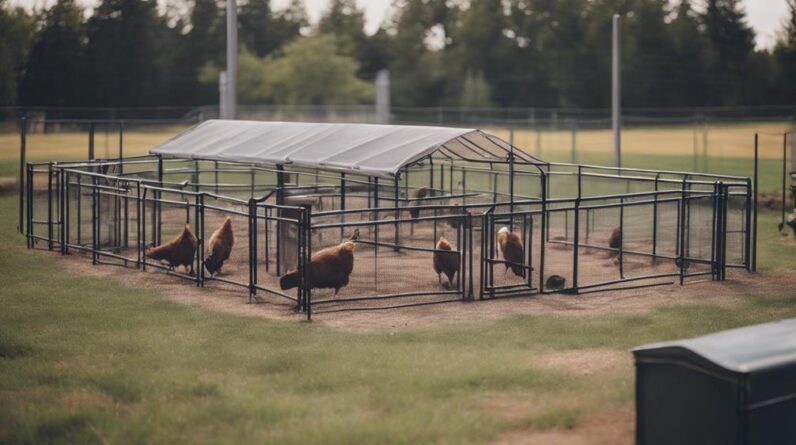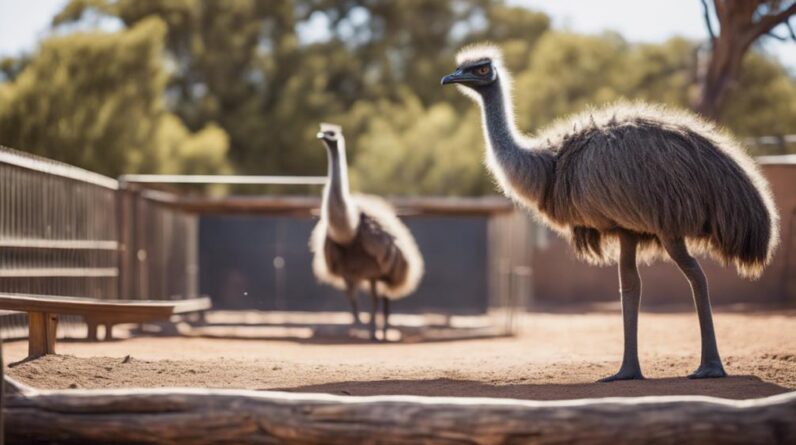
If you aim to breed emus successfully, did you know that emus are the second-largest living bird by height, after the ostrich? Understanding the intricacies of their breeding process is crucial for ensuring the health and vitality of these unique creatures. By exploring expert tips on selecting breeding stock, providing proper housing, and implementing a nutritious diet, you can set the stage for a rewarding breeding experience.
Key Takeaways
- Select healthy breeding stock with good physical conformation and genetic diversity.
- Provide spacious, secure housing with proper ventilation and maintenance.
- Ensure a nutritious diet rich in protein, vitamins, and minerals.
- Monitor reproductive cycles, behaviors, and physical changes for successful breeding.
- Seek veterinary care, vaccinations, and expert advice for optimal breeding outcomes.
Understanding Emu Behavior
When breeding emus, understanding their behavior is crucial for successful management and care. Emus are highly social birds that live in groups called mobs. Within these mobs, they establish a hierarchy based on dominance, which can affect breeding dynamics. Dominant emus may exhibit more aggressive behavior, especially during mating season, so it's essential to monitor these interactions to ensure the well-being of all birds in the group.
Emus are known for their curious nature and can sometimes be easily startled, leading to potential stress or injury. It's important to provide them with a calm and secure environment to prevent unnecessary disturbances. Additionally, emus are territorial animals, and conflicts may arise if they feel their space is threatened. Understanding their territorial behavior can help prevent aggression and ensure a harmonious breeding environment.
Selecting Healthy Breeding Stock
To ensure successful breeding outcomes, it's imperative to carefully select healthy breeding stock for your emu operation. When choosing emus for breeding, consider the following:
- Physical Conformation: Select birds with strong, well-developed bodies, straight legs, and smooth feathers. Avoid individuals with deformities, such as crooked toes or beaks, as these can impact breeding success.
- Health History: Obtain detailed health records for potential breeding stock, including vaccination history and any past illnesses. It's crucial to ensure the birds are free from diseases that could affect their reproductive capabilities.
- Genetic Diversity: Aim for genetic variation within your breeding stock to prevent inbreeding and maintain overall health and vigor in the offspring. Consider factors like coloration, size, and temperament when selecting emus for breeding to create a robust and diverse population.
Providing Proper Housing and Space
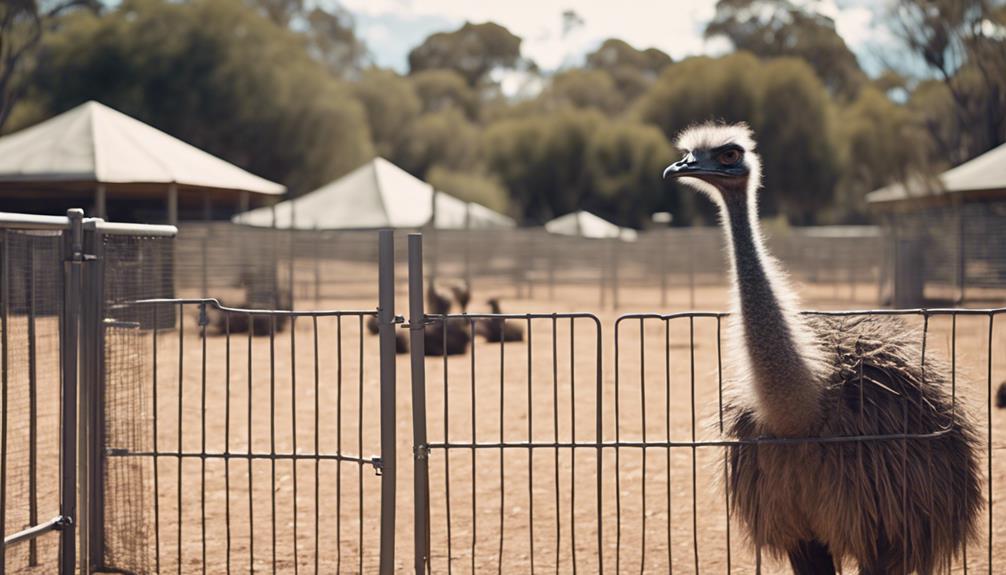
For optimal breeding success, ensuring emus have proper housing and sufficient space is crucial. Emus require spacious and secure enclosures to thrive in a breeding environment. The housing should provide protection from extreme weather conditions and predators while allowing for natural behaviors like nesting and mating.
Construct shelters that are sturdy and well-ventilated to accommodate the emus comfortably. The area should be large enough to allow for adequate movement and exercise. Emus are active birds that need space to roam and exhibit their natural behaviors.
When designing the housing area, consider factors such as drainage to prevent waterlogging, fencing to ensure security, and nesting spaces for breeding pairs. Adequate space is essential to reduce stress and aggression among emus, which can impact breeding success.
Regularly inspect the housing structures for any signs of wear and tear, and ensure cleanliness to maintain a healthy environment for the emus. Providing proper housing and ample space is fundamental in creating an ideal setting for successful emu breeding.
Implementing a Nutritious Diet
Looking to optimize the breeding success of your emus? Implementing a nutritious diet is crucial for the health and fertility of your breeding emus. Here are three key factors to consider:
- Protein-Rich Feed: Emus require a diet high in protein to support their growth and reproductive functions. Ensure their feed contains sufficient protein, ideally around 20-24%, to meet their nutritional needs during breeding season.
- Vitamins and Minerals: Provide emus with a balanced diet rich in vitamins and minerals essential for reproductive health. Key nutrients include vitamin E, selenium, and calcium. Consider supplementing their diet if necessary to prevent deficiencies.
- Fatty Acids: Incorporate sources of omega-3 and omega-6 fatty acids into their diet to support egg production and overall reproductive success. Fish oil or flaxseed can be excellent additions to ensure the emus receive an adequate intake of essential fatty acids for optimal breeding performance.
Monitoring Reproductive Cycles
Regularly monitor the reproductive cycles of your breeding emus to track their fertility and optimize breeding success. Understanding the reproductive patterns of emus is crucial for maximizing breeding efficiency. Female emus typically lay eggs during the warmer months, with peak laying occurring from November to March. By closely observing their behavior and physical changes, such as increased vocalization and egg-laying postures, you can predict when they're approaching their fertile period.
To monitor reproductive cycles effectively, keep detailed records of each emu's egg-laying dates, egg production rates, and any abnormalities in their cycle. This data will help you identify patterns and potential issues that may affect fertility. Additionally, consider implementing hormone testing to assess reproductive health and pinpoint the best time for breeding.
Consult with a veterinarian or experienced emu breeder to learn how to conduct hormone tests accurately and interpret the results. By monitoring your emus' reproductive cycles diligently, you can make informed decisions to enhance breeding outcomes and maintain a healthy breeding population.
Ensuring Optimal Incubation Conditions
To ensure optimal incubation conditions for your emu eggs, maintain consistent temperature and humidity levels within the incubator. Proper environmental control is crucial for the successful development of emu embryos. Here are three key factors to consider:
- Temperature Control: Set the temperature in the incubator to around 97.5 to 98.5 degrees Fahrenheit (36.4 to 36.9 degrees Celsius) for best results. Fluctuations in temperature can negatively impact the developing embryos, so ensure a stable and consistent heat source.
- Humidity Levels: Maintain a relative humidity of about 25-35% for the first 50 days of incubation, then increase it to 45-55% for the remaining days. Adequate humidity is essential for the proper growth and hatching of emu eggs.
- Ventilation: Proper ventilation is crucial to prevent the buildup of harmful gases within the incubator. Ensure there's adequate airflow to provide fresh oxygen to the developing embryos and to remove carbon dioxide.
Managing Breeding Pairs
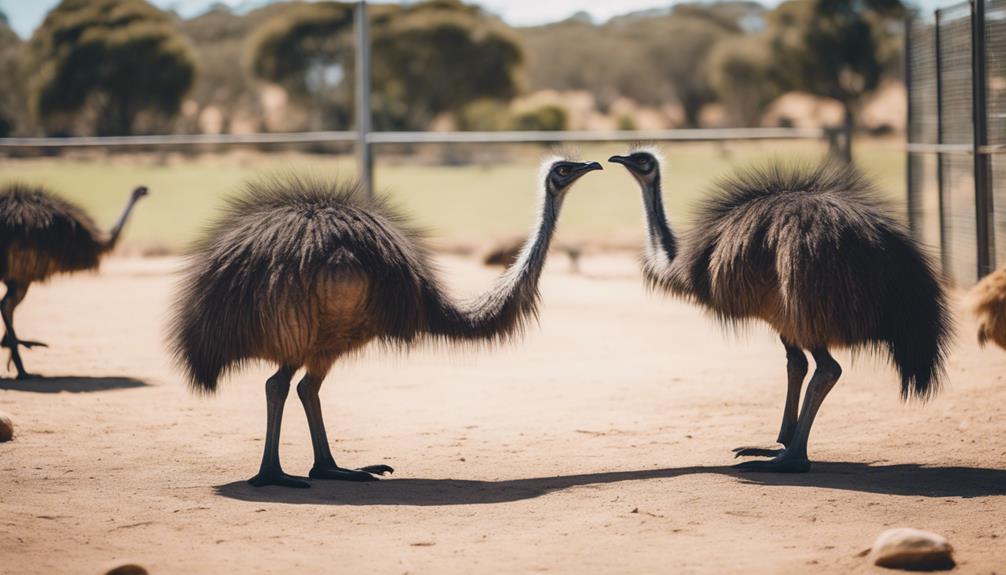
For successful breeding of emus, it's important to carefully manage the breeding pairs to optimize reproductive outcomes. When selecting breeding pairs, ensure that they're mature, healthy, and unrelated to prevent genetic issues. Monitor the birds closely for signs of aggression or compatibility issues, as stress can hinder breeding success.
Provide breeding pairs with a spacious and secure environment that includes shelter and nesting areas. Emus are territorial, so separate pairs if aggression arises. Maintain a balanced diet rich in protein and essential nutrients to support reproductive health. Regularly assess the birds' body condition and adjust feeding accordingly.
Observe the breeding pairs for mating behavior, which typically occurs in the cooler months. Monitor the female for signs of egg-laying and ensure she's a suitable nest for incubation. Avoid disturbing the pairs excessively during the breeding season to minimize stress.
Handling Eggs Carefully
When handling emu eggs, ensure gentle and precise movements to avoid damaging the delicate shells. Emu eggs are significantly larger than chicken eggs, with a dark green color and a thick shell that requires careful handling to prevent breakage.
Here are three essential tips for handling emu eggs carefully:
- Support the Weight: Emu eggs are heavy, weighing around 1 to 1.5 pounds. When picking up an emu egg, make sure to support its weight evenly with both hands to avoid putting excessive pressure on one side of the shell.
- Use Soft Padding: To prevent the eggs from rolling or shifting during transportation or storage, place them on a soft and cushioned surface. This will help absorb any shocks or impacts that could potentially damage the eggs.
- Avoid Sudden Movements: Emu eggshells are relatively thin compared to their size, making them more susceptible to cracking. Avoid sudden movements or impacts when handling the eggs to maintain their structural integrity.
Recognizing Signs of Illness
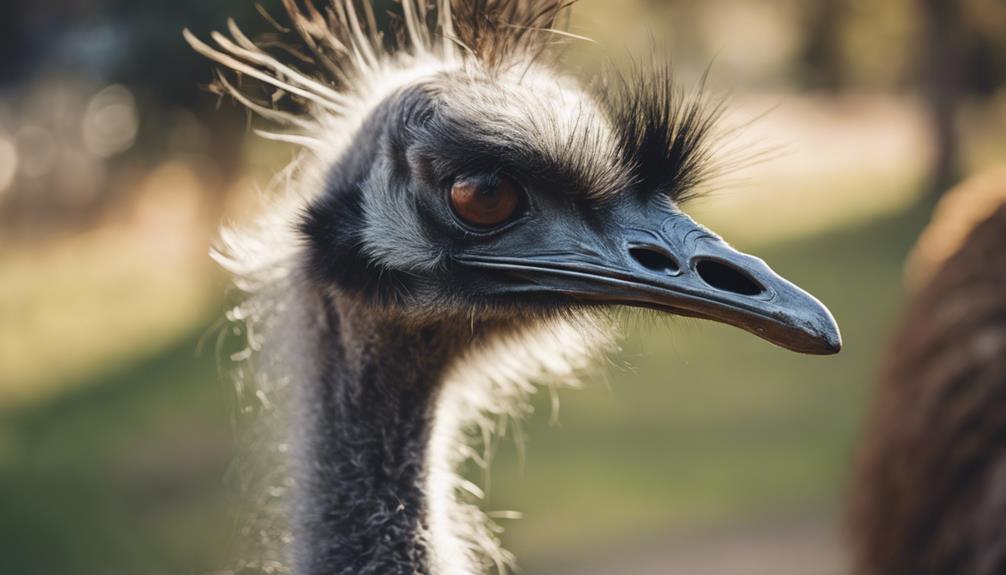
Recognize early signs of illness in emus by closely monitoring their behavior and physical condition for any deviations from normalcy. Emus are known to hide signs of sickness, making it crucial to be vigilant. Look for symptoms such as lethargy, droopy wings, decreased appetite, abnormal feces, lameness, or unusual vocalizations. Additionally, observe their posture and breathing patterns, as any irregularities could indicate underlying health issues.
Regularly check the emus' eyes for any cloudiness, discharge, or swelling, which may suggest infections or other problems. Monitor their skin for lesions, flakiness, or bald patches, as these can be signs of dermatological issues or parasites. Pay attention to their gait and coordination, as any stumbling, unsteadiness, or reluctance to move could signal neurological concerns.
Promptly isolating any sick emus is crucial to prevent potential spread of diseases within the flock. Contact a qualified avian veterinarian immediately if you notice any concerning signs, as early intervention is key to successful treatment and maintaining the health of your emus.
Planning for Veterinary Care
To ensure the optimal health and well-being of your emus, establishing a comprehensive plan for veterinary care is essential. Emus, like any other livestock, require regular veterinary check-ups and prompt medical attention when needed.
Here are three crucial aspects to consider when planning for veterinary care:
- Find a Specialist: Locate a veterinarian experienced in treating exotic birds like emus. A specialist will have the expertise to diagnose and treat any specific health issues that may arise in your emus accurately.
- Vaccination Schedule: Work with your veterinarian to develop a vaccination schedule tailored to your emus' needs. Vaccinations are crucial in preventing common diseases and maintaining the overall health of your flock.
- Emergency Plan: Establish an emergency plan in case of sudden illness or injury. Know the nearest avian emergency clinic and have a protocol in place to transport sick or injured emus promptly.
Embracing Patience in Breeding
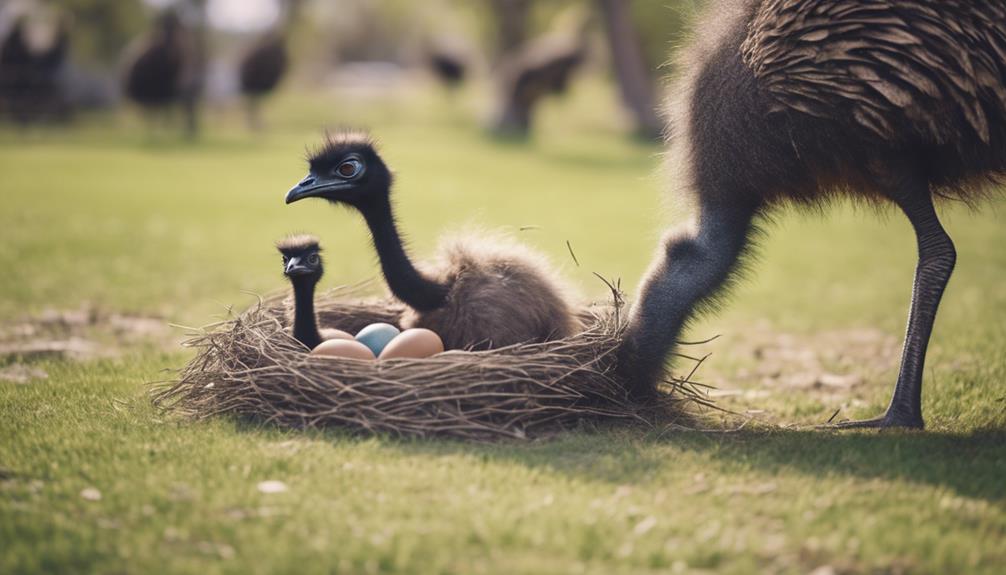
Emus breeding requires a significant amount of patience to achieve successful outcomes in the long term.
Breeding emus is a process that demands dedication and perseverance. Emus reach sexual maturity at around two years of age, and breeding success may not be immediate.
Emus are known to be selective breeders, meaning they may not always mate with the first partner presented to them. This can lead to delays in successful breeding attempts.
Additionally, emus lay eggs only once a year during the breeding season, which further emphasizes the need for patience.
It's crucial to allow the emus to establish strong bonds with their chosen partners before expecting successful breeding results. Rushing the breeding process can lead to stress and potentially unsuccessful outcomes.
Therefore, embracing patience and allowing the emus to follow their natural instincts and timelines is key to achieving successful breeding results in the long run.
Nurturing Emu Chicks to Maturity
Moving from the process of breeding emus, the next step involves carefully nurturing emu chicks to ensure their healthy growth and development. To successfully nurture emu chicks to maturity, follow these expert tips:
- Provide Adequate Shelter: Construct a predator-proof enclosure with proper ventilation to protect the emu chicks from extreme weather conditions and potential threats. Ensure the enclosure is spacious enough to allow the chicks to move around freely.
- Maintain a Balanced Diet: Emu chicks require a diet rich in protein and essential nutrients for optimal growth. Feed them a specialized emu chick starter feed to meet their nutritional requirements. Additionally, provide access to clean water at all times to keep them hydrated.
- Monitor Health and Well-being: Regularly inspect the emu chicks for any signs of illness or distress. Keep their living area clean and conduct routine health checks to prevent diseases. Consult with a veterinarian if you notice any abnormalities in their behavior or appearance.
Frequently Asked Questions
Can Emus Be Bred in a Mixed-Species Environment?
Yes, emus can be bred in a mixed-species environment. However, it is crucial to consider the compatibility and needs of other species to ensure the well-being of all animals involved. Proper management and monitoring are key.
What Are the Potential Challenges of Breeding Emus in a Cold Climate?
Breeding emus in a cold climate poses challenges like ensuring proper shelter, maintaining warmth, and preventing frostbite. It's crucial to provide insulated housing, adjust feeding for increased energy needs, and monitor closely for health issues.
How Do You Prevent Inbreeding in Emu Breeding Programs?
To prevent inbreeding in emu breeding programs, you must carefully track the lineage of each bird, rotate breeding pairs to diversify genetics, and consider bringing in new emus from outside sources. Vigilance and strategic planning are key.
Are There Specific Regulations or Permits Needed for Breeding Emus?
To breed emus, you must adhere to specific regulations. Obtain permits from local authorities, ensuring compliance with wildlife laws. Seek guidance from experts to navigate legal requirements for successful emu breeding programs.
What Are the Common Mistakes to Avoid When Breeding Emus?
When breeding emus, avoid mistakes like overcrowding enclosures, inadequate nutrition, and improper incubation conditions. Ensure proper hygiene, monitor health regularly, and have a contingency plan for emergencies. Following expert advice and guidelines is crucial for successful breeding.
Conclusion
You've now learned the expert tips for breeding emus, but did you know that recent studies suggest that playing calming music for emus during the breeding process can actually increase their reproductive success rates?
By incorporating this innovative approach into your breeding practices, you may just see even better results and happier, healthier emus in your care.
Keep striving for the best outcomes by staying informed and open to new research findings in the field of emu breeding.





